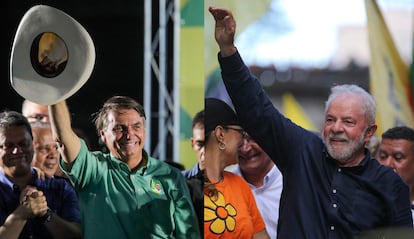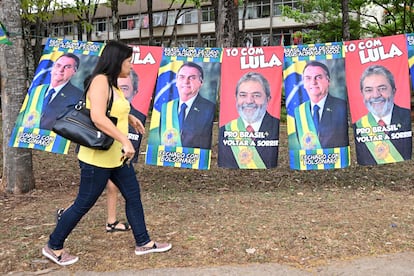Lula and Bolsonaro remove the gloves as Brazil presidential election goes to the wire
The polls point to a technical tie between the two candidates, who are courting undecided voters and seeking to curb abstentionism ahead of a final face-to-face meeting on Friday

Luiz Inácio Lula da Silva or Jair Bolsonaro. Or neither of the two. More than 90% of Brazilian voters have already decided which way they will cast their ballot in the runoff of the presidential elections on October 30, but there is a key section of the electorate that has yet to decide which candidate to back, or whether to vote none of the above. In one of the tightest election campaigns of recent times – some polls point to a technical tie between Lula and Bolsonaro – the estimated 5% of undecided voters could prove key to swinging victory one way or the other. In the final week before the runoff election, seducing these potential voters – and reducing abstentionism – has become the priority for both camps, who have been targeting key states and appealing directly to various sections of society: the outcome of Sunday’s ballot may depend on apparently innocuous factors such as providing free bus fares on election day or the proximity of a public holiday.
In Rio de Janeiro last week, soccer briefly relegated the upcoming election among Brazilians. The colors of the political candidates were replaced by those of Rio-based team Flamengo and their opponents Corinthians, of São Paulo. Even so, fans on their way to the game at the Maracanã were happy to share their political leaning. “Bolsonaro!” responded a middle-aged couple on their way to the stadium, located in an affluent Rio neighborhood. “Lula, or course!” said a Black woman with dreadlocks. In a sea of partisan favoritism, Pedro Heredia, 27, provided a rare exception. A firm supporter of Flamengo, the factory worker is not as convinced by the candidates. “I think I’ll vote none of the above,” he says. “I doubt either of them are capable of taking Brazil to the level it deserves. They do not represent the new generation.” Heredia’s girlfriend, Isabela Goretti, has resigned herself to voting for the leftist leader. “The main thing is to not vote for Bolsonaro.”

Abstentionism a concern for both Bolsonaro and Lula
Both Lula and Bolsonaro are as eager to convince the undecided voters as they are to ensure people go out and vote. In the first round, in which Lula scored 5.2% more of the ballot (some six million votes) than Bolsonaro but fell short of the 50% needed to avoid a runoff, abstention stood at 21%, the highest level since 1998. According to Glauco Peres, a professor of political science at the University of São Paulo, abstentionism could be more important than swaying undecided voters. “In this election, everybody knows who the candidates are. Voters are very convinced.”
In Peres’ view, Lula’s Workers’ Party (PT) would come off worst is the level of abstentionism remains as high as in the first round. “Normally, those who abstain are among the poorer classes, who vote mostly for him. His challenge is not to convince them to vote for the PT, but to ensure that they go to the polling station.” Marco Antonio Teixeira, of the Fundação Getulio Vargas think tank, notes that abstention would hit Bolsonaro hardest in the southeast – “his strongest voter base” – while Lula would suffer in the northeast.
This is where the matter of public transportation comes in. Lula’s PT is extremely concerned about the availability of free public transportation on October 30, but there is little it can do. Each local administration makes the decision. In Rio, which is governed by the left, there will be free municipal buses on election day. In São Paulo, where a Bolsonaro ally is in power, there will not. Another factor that neither candidate can influence is the public holiday on Friday, October 28. That is more of a concern for Bolsonaro, whose largest support base is among the wealthier classes, who may take the opportunity to enjoy a long weekend at the beach. In a majority of states, the holiday has been postponed by two weeks in response.
Historically, abstention in Brazil has been higher in the second round of voting than in the first. However, both Teixeira and Peres concur that this time could be very different because voters know there is much more at stake. “These elections have a different connotation,” says Teixeira. “They will not only decide who governs, but also a project for the country.”
Assuming neither candidate commits an irreparable error beforehand – Bolsonaro remains on Lula’s heels despite a scandal over a sexual comment the current president made about some Venezuelan minors, which forced him into an apology for the “misunderstanding” – the final televised debate on October 28 will be staged in an atmosphere of maximum expectation. The previous face-to-face meeting between the candidates was notably civilized, even though the campaign was at its dirtiest ebb.
Bolsonaro and Lula both propose antagonistic models, but the health of Brazilian democracy is also at stake, weakened as it has been by a president who treats the opposition and critical media as enemies, who systematically questions the Supreme Court and who has sown doubts about the reliability of electronic ballot boxes and wants the armed forces to oversee the voting and counting. The future of the Amazon and its effects on climate change also hang in the balance of Sunday’s results.
Tu suscripción se está usando en otro dispositivo
¿Quieres añadir otro usuario a tu suscripción?
Si continúas leyendo en este dispositivo, no se podrá leer en el otro.
FlechaTu suscripción se está usando en otro dispositivo y solo puedes acceder a EL PAÍS desde un dispositivo a la vez.
Si quieres compartir tu cuenta, cambia tu suscripción a la modalidad Premium, así podrás añadir otro usuario. Cada uno accederá con su propia cuenta de email, lo que os permitirá personalizar vuestra experiencia en EL PAÍS.
¿Tienes una suscripción de empresa? Accede aquí para contratar más cuentas.
En el caso de no saber quién está usando tu cuenta, te recomendamos cambiar tu contraseña aquí.
Si decides continuar compartiendo tu cuenta, este mensaje se mostrará en tu dispositivo y en el de la otra persona que está usando tu cuenta de forma indefinida, afectando a tu experiencia de lectura. Puedes consultar aquí los términos y condiciones de la suscripción digital.








































